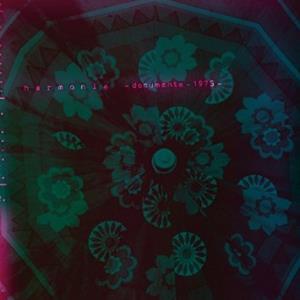1 + 1 = 3. Mathematically this is wrong, but in the illogical world of music it is possible. Sometimes a collaboration between artists and bands can be more than the sum of the parts. Like when people inspire each other to come out of their comfort zones to try something new. Harmonia is a good example of this. After the release of the second Neu! album Neu 2 in 1972, Michael Rother and Klaus Dinger wanted to do a tour to support the album. Since they were a duo, they were looking for musicians to support them. Rother thought of Dieter Möbius and Hans-Joachim Roedelius, the duo Cluster. Möbius and Roedelius had just left Berlin and set up their studio and living space in an old farm in the rural town of Forst. So Rother went there to visit them. Rother and Dinger were completely different personalities and they would argue a lot. Often producer Conny Plank had to act as a mediator. Despite that the collisions with Dinger produced some fine music but playing in Neu! was quite stressful for Rother. So working with Möbius and Roedelius was a revelation for Rother. He felt relaxed and felt inspired by the environment. Instead of touring with Neu! Rother stayed in Forst and they recorded the first Harmonia album Musik Von Harmonia (1973). When they weren't making music they took long walks in the environment and in a way this is captured in the music. The rhythmic mumbling of water flowing in the river and the wind that stirs the trees; it is quiet and hypnotic. Rother still had contractual obligations to record another album with Neu! The album Neu! 75 has clearly two different sides. The Rother side is far more laidback and relaxed, while the Dinger side is more rhythmic and aggressive. Rother then returned to Forst and to Harmonia. In 1975 the second album Harmonia de Luxe followed. One of their devotees was Brian Eno. Eno had played shortly in Roxy Music and after that released a few solo albums as well as collaborating with Robert Fripp. He joined them on the farm in Forst. Throughout 1976 a number of recordings were made but not released due to the lack of money. Michael Rother then embarked on a solo career. Eno and Cluster released 2 albums which are pretty much in the same spirit as Harmonia. After that Eno went to Berlin to work with David Bowie. Möbius and Roedelius released a few more albums as Cluster and then also went solo. Some 30 years later there was a renewed interest in the music of Harmonia. Grönland released Live 1974 in 2007 and in 2009 at last the Harmonia/Eno recordings Tracks And Traces were officially released (part of it had been available on a rare Japanese bootleg) under the name Harmonia 76. And in 2010 the trio Rother, Möbius and Roedelius did a few concerts as Harmonia. But they played only old material and did not intend to record new music. With the death of Dieter Möbius on 20 July 2015 Harmonia came to a definitive end. In 2015 Grönland released a 6 LP box set The Complete Works which included Music Von Harmonia, Harmonia De Luxe, Live 1974 and Tracks And Traces. In addition one LP contained 4 tracks that had not been available before. These tracks had been preserved by Asmus Tietchens. Not many recordings survived because due to the lack of money many tapes were reused, wiping off the original recording. Despite that the tape had been lying in an archive for almost 40 years the quality was still very good. For the people that thought the box was too expensive or still don't have a record player there is now good news: the bonus album is now also available as a separate release, both on CD and LP. The album contains 4 tracks, 2 live tracks and 2 tracks that were recorded in their studio in Forst. One of the studio tracks is an early version of Deluxe Immer Wieder, a track from the Harmonia De Luxe album. The other studio track and both live tracks were unknown until now. The live tracks were recorded in 2 shows in Hamburg, on February 8 in Fabrik and on February 9 at Onkel Pö, a venue that was at the time specializing in modern jazz. The two live tracks are especially outstanding and quite different from their regular work. They sound also close to Can. One of the reasons for this is that drummer Mani Neumeier (from Guru Guru) is a guest. The real drums give the music an extra dimension. The sound quality is excellent. Harmonia may not be as well known as Kraftwerk and Tangerine Dream, but is just as essential. Its music does not have the minimalistic high tech approach of Kraftwerk nor the sequencer driven approach from the Berlin school but much of today's electronic music is tributary. Documents 1975 is not just a bonus album, it stands on itself and is highly recommended for anyone that loves Krautrock or the electronic music of the 1970s. ***** Erik Gibbels (edited by Robert James Pashman) Where to buy? |
